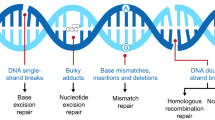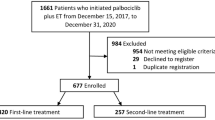Abstract
Purpose
Poziotinib is an irreversible pan-inhibitor of the human epidermal growth factor receptor (HER) that has shown acceptable tolerability and antitumor activity in phase I and II trials in patients with advanced solid tumors. In the present open-label, multicenter phase II study, we demonstrate safety, tolerability, and preliminary efficacy data from two different dosing schedules in patients with HER2-positive advanced breast cancer.
Patients and methods
Patients who had received at least two prior HER2-directed therapy lines for advanced disease, received 24 mg poziotinib on an intermittent dosing schedule (cohort 1) or 16 mg poziotinib once daily on a continuous dosing schedule (cohort 2). The primary endpoint was overall response rate (ORR). Secondary endpoints were progression-free survival (PFS), disease control rate (DCR), and time to progression (TTP). Secondary endpoints additionally included safety and pharmacokinetics.
Results
A total of 67 patients were enrolled. The ORR was 30% in both groups (p = 0.98). DCR was 60% vs 78% (p = 0.15) and median PFS and TTP were 4.1 vs 4.9 months (both p = 0.30) for cohorts 1 and 2, respectively. The most common treatment related adverse events (AEs) of any grade included diarrhea (88% vs 85%, p = 0.76), rash (88% vs 88%, p = 0.96), and stomatitis (64% vs 56%, p = 0.52), with grade 3–4 diarrhea occurring in 33% vs 32% of patients (p = 0.93) and grade 3–4 rash in 27% vs 35% of patients (p = 0.48) in cohort 1 vs cohort 2, respectively.
Conclusion
Poziotinib demonstrated evidence of clinical activity in patients with pre-treated HER2-positive advanced breast cancer, although high levels of toxicity may preclude further studies at this time.

Similar content being viewed by others
Data availability
Data available on request of the senior author.
References
Howlader N, Altekruse SF, Li CI, Chen VW, Clarke CA, Ries LA et al (2014) US incidence of breast cancer subtypes defined by joint hormone receptor and HER2 status. J Natl Cancer Inst 106(5):dju055. https://doi.org/10.1093/jnci/dju055
Loibl S, Gianni L (2017) HER2-positive breast cancer. Lancet 389(10087):2415–2429. https://doi.org/10.1016/S0140-6736(16)32417-5
Smith AE, Ferraro E, Safonov A, Morales CB, Lahuerta EJA, Li Q et al (2021) HER2 + breast cancers evade anti-HER2 therapy via a switch in driver pathway. Nat Commun 12(1):6667. https://doi.org/10.1038/s41467-021-27093-y
Smyth LM, Piha-Paul SA, Won HH, Schram AM, Saura C, Loi S et al (2020) Efficacy and determinants of response to HER kinase inhibition in HER2-mutant metastatic breast cancer. Cancer Discov 10(2):198–213. https://doi.org/10.1158/2159-8290.CD-19-0966
Razavi P, Chang MT, Xu G, Bandlamudi C, Ross DS, Vasan N et al (2018) The genomic landscape of endocrine-resistant advanced breast cancers. Cancer Cell. 34(3):427–38 e6. https://doi.org/10.1016/j.ccell.2018.08.008
Cocco E, Lopez S, Santin AD, Scaltriti M (2019) Prevalence and role of HER2 mutations in cancer. Pharmacol Ther 199:188–196. https://doi.org/10.1016/j.pharmthera.2019.03.010
Yi Z, Rong G, Guan Y, Li J, Chang L, Li H et al (2020) Molecular landscape and efficacy of HER2-targeted therapy in patients with HER2-mutated metastatic breast cancer. NPJ Breast Cancer 6:59. https://doi.org/10.1038/s41523-020-00201-9
Curigliano G, Mueller V, Borges V, Hamilton E, Hurvitz S, Loi S et al (2022) Tucatinib versus placebo added to trastuzumab and capecitabine for patients with pretreated HER2+ metastatic breast cancer with and without brain metastases (HER2CLIMB): final overall survival analysis. Ann Oncol 33(3):321–329. https://doi.org/10.1016/j.annonc.2021.12.005
Nasrazadani A, Brufsky A (2020) Neratinib: the emergence of a new player in the management of HER2+ breast cancer brain metastasis. Future Oncol 16(7):247–254. https://doi.org/10.2217/fon-2019-0719
Marti JLG, Hyder T, Nasrazadani A, Brufsky AM (2020) The evolving landscape of HER2-directed breast cancer therapy. Curr Treat Options Oncol 21(10):82. https://doi.org/10.1007/s11864-020-00780-6
Le X, Cornelissen R, Garassino M, Clarke JM, Tchekmedyian N, Goldman JW et al (2022) Poziotinib in non-small-cell lung cancer harboring HER2 Exon 20 insertion mutations after prior therapies: ZENITH20-2 trial. J Clin Oncol 40(7):710–718. https://doi.org/10.1200/JCO.21.01323
Tucker N. FDA denies approval of poziotinib for advanced/metastatic NSCLC with HER2 exon 20 insertions 2022. Available from: https://www.targetedonc.com/view/fda-denies-approval-of-poziotinib-for-advanced-metastatic-nsclc-with-her2-exon-20-insertions
Eisenhauer EA, Therasse P, Bogaerts J, Schwartz LH, Sargent D, Ford R et al (2009) New response evaluation criteria in solid tumours: revised RECIST guideline (version 1.1). Eur J Cancer. 45(2):228–47. https://doi.org/10.1016/j.ejca.2008.10.026
Kim TM, Lee KW, Oh DY, Lee JS, Im SA, Kim DW et al (2018) Phase 1 Studies of poziotinib, an irreversible Pan-HER tyrosine kinase inhibitor in patients with advanced solid tumors. Cancer Res Treat 50(3):835–842. https://doi.org/10.4143/crt.2017.303
Park YH, Lee KH, Sohn JH, Lee KS, Jung KH, Kim JH et al (2018) A phase II trial of the pan-HER inhibitor poziotinib, in patients with HER2-positive metastatic breast cancer who had received at least two prior HER2-directed regimens: results of the NOV120101-203 trial. Int J Cancer 143(12):3240–3247. https://doi.org/10.1002/ijc.31651
von Minckwitz G, Huang CS, Mano MS, Loibl S, Mamounas EP, Untch M et al (2019) Trastuzumab emtansine for residual invasive HER2-positive breast cancer. N Engl J Med 380(7):617–628. https://doi.org/10.1056/NEJMoa1814017
Cortes J, Kim SB, Chung WP, Im SA, Park YH, Hegg R et al (2022) Trastuzumab deruxtecan versus trastuzumab emtansine for breast cancer. N Engl J Med 386(12):1143–1154. https://doi.org/10.1056/NEJMoa2115022
Kim HJ, Kim HP, Yoon YK, Kim MS, Lee GS, Han SW et al (2012) Antitumor activity of HM781-36B, a pan-HER tyrosine kinase inhibitor, in HER2-amplified breast cancer cells. Anticancer Drugs 23(3):288–297. https://doi.org/10.1097/CAD.0b013e32834e7d9b
Robichaux JP, Elamin YY, Vijayan RSK, Nilsson MB, Hu L, He J et al (2019) Pan-cancer landscape and analysis of ERBB2 mutations identifies poziotinib as a clinically active inhibitor and enhancer of T-DM1 activity. Cancer Cell. 36(4):444–57 e7. https://doi.org/10.1016/j.ccell.2019.09.001
Kalra R, Chen CH, Wang J, Salam AB, Dobrolecki LE, Lewis A et al (2022) Poziotinib inhibits HER2-mutant-driven therapeutic resistance and multiorgan metastasis in breast cancer. Cancer Res 82(16):2928–2939. https://doi.org/10.1158/0008-5472.CAN-21-3106
Funding
Financial support: Spectrum Pharmaceuticals.
Author information
Authors and Affiliations
Corresponding author
Ethics declarations
Conflicts of interest
AN: Declares that she does not have conflicts of interest. JLGM: declares that he does not have conflicts of interest. ZM: Did not declare any conflicts of interest. KL: Did not declare any conflict of interest. MG: Did not declare any conflict of interest. JP: Did not declare any conflict of interest. KSW: Did not declare any conflicts of interest. JY: Did not declare any conflicts of interest. SS: Did not declare any conflicts of interest. AR: Did not declare any conflicts of interest. GB, SYL: employed at Spectrum Pharmaceuticals. AB: Consultant for Astrazeneca, Pfizer, Novartis, Lilly, Genentech/Roche, SeaGen, Daiichi Sankyo, Merck, Agendia, Sanofi, Puma, Myriad, Gilead, Epic Biosciences, Blueprint, Caris, Tempus. Research support from Agendia, Astrazeneca.
Ethical approval
The clinical study protocol and written informed consent form were reviewed and approved by the respective Independent Ethics Committees or IRBs, and consistent with the internal Standard Operating Procedures of Spectrum Pharmaceuticals, Inc. The study was conducted in accordance with Good Clinical Practice. The study was compliant with the World Medical Association Declaration of Helsinki concerning written informed consent and the protection of rights of human subjects.
Additional information
Publisher's Note
Springer Nature remains neutral with regard to jurisdictional claims in published maps and institutional affiliations.
Supplementary Information
Below is the link to the electronic supplementary material.
Rights and permissions
Springer Nature or its licensor (e.g. a society or other partner) holds exclusive rights to this article under a publishing agreement with the author(s) or other rightsholder(s); author self-archiving of the accepted manuscript version of this article is solely governed by the terms of such publishing agreement and applicable law.
About this article
Cite this article
Nasrazadani, A., Marti, J.L.G., Lathrop, K. et al. Poziotinib treatment in patients with HER2-positive advanced breast cancer who have received prior anti-HER2 regimens. Breast Cancer Res Treat 205, 29–37 (2024). https://doi.org/10.1007/s10549-023-07236-z
Received:
Accepted:
Published:
Issue Date:
DOI: https://doi.org/10.1007/s10549-023-07236-z




